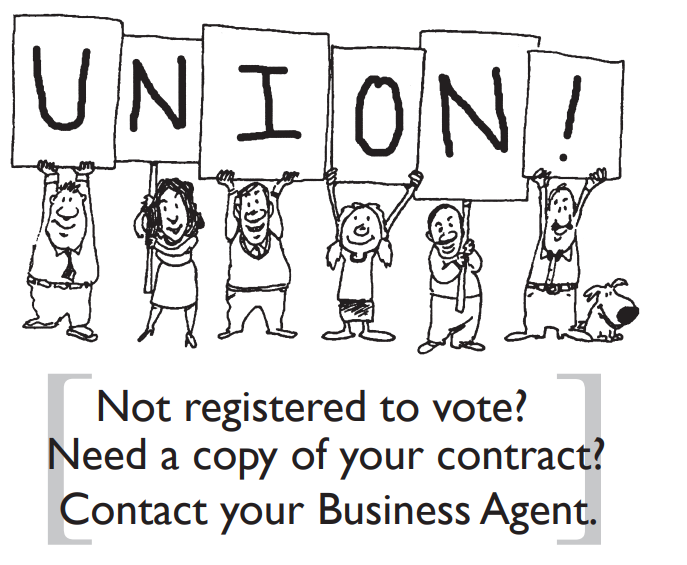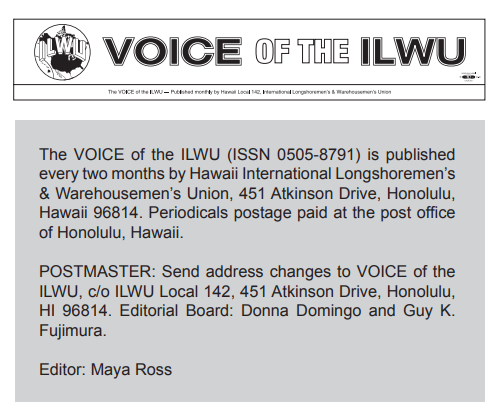Welcome to the ILWU!
Are you a new employee, hired within the last twelve months? If so, this issue of the Voice of the ILWU was prepared especially for you. As a union member, you are entitled to many rights and benefits and some responsibilities. This issue will help get you started with the essential information you need as a member of the ILWU. (Even longtime members may find the information useful.) First of all, the Voice of the ILWU is the official newspaper of the ILWU Local 142. You are receiving the newspaper because you are now a member of the ILWU. Your membership in the ILWU started when you were hired into your job. At the time you were hired, you signed a form, which allows for the automatic payment of union dues by payroll deduction. This form also serves as an application for membership in the union.
—More on pages 6, 7 and 8
As a member of ILWU Local 142, you are part of a long and proud tradition where workers join or form organizations for their mutual benefit and to promote fairness and justice on the job. These organizations are called labor unions, trade unions, or just unions.
In Hawaii, one out of every four workers are members of a labor union. The most common kind of union is based on the job the worker does. For example, there are unions of airline pilots, firefighters, bricklayers, teachers, and nurses, and only workers who do those jobs are members of those unions. Another kind of union is based on an entire industry—such as hotel workers, government employees, or postal workers. A third kind of union, like the ILWU, organizes and includes workers from many different industries. This kind of unionism brings the highest level of unity to workers.
There are 18,000 ILWU members on all major islands in Hawaii, which makes the ILWU one of the largest unions in Hawaii. ILWU members work in every major industry including: tourism, longshore, sugar, pineapple, manufacturing, transportation, and hospitals. ILWU members hold diverse jobs—they include mechanics, drivers, cooks, hotel housekeepers, store cashiers, computer clerks, hospital technicians, and more.

Organization for mutual benefit
A third and very important benefit of union membership goes far beyond your job. You are now a member of a workers’ organization—dedicated to defend your interests as a worker and to promote the general welfare of you and your family.
This is spelled out in the ILWU Declaration of Principles:
We, the men and women working under the jurisdiction of ILWU Local 142 Hawaii, in order to build and maintain a strong local organization and provide for the defense of our common interests, promote the general welfare of our members, their families and other wage earners in the community, and uphold the rights and dignity of our labor and its organized expression, have determined that we shall be guided by the following principles . . .
One of the most important ways the union defends our interests is through union political action. The legal system is extremely important to working people. Laws can be passed to give additional rights and protection to workers or, just as easily, take away workers’ rights and protections. In our country, the U.S. Congress and our State Legislature have the power to make new laws and change old laws. Every year in Hawaii, our State Legislature considers thousands of bills that propose changes in our laws—some of these proposals benefit workers and some take away rights and benefits. For this reason, the ILWU and other unions must be actively involved in the legislative process, monitoring all of the bills, stopping legislation that would hurt working families, and urging legislators to pass legislation that benefit workers.
The success or failure of union political action depends on numbers— it takes a majority of legislators to pass a piece of legislation. This is why the ILWU and other unions endorse certain candidates over others during the elections. In the last election in 2010, the ILWU Political Action Committee interviewed dozens of candidates and questioned them on issues important to workers.
Union members were then urged to vote for only those candidates who would support working families.
A Guide to the ILWU: What every member should know continues on page 6

